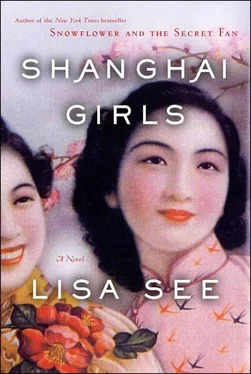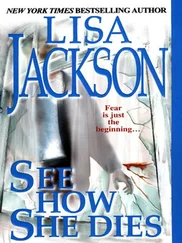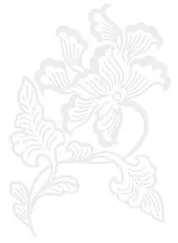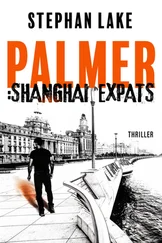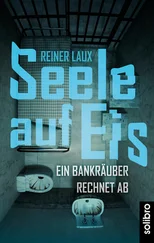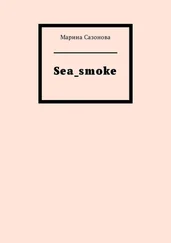“We could go north to Tientsin and look for passage on a ship,” Mama tries again, but this time she holds up a hand to keep my sister and me from speaking. “I know. The monkey people are there already. We could go east, but how long before those areas are invaded?” She pauses to think. It’s as though I can see through her skull and into her brain as she anticipates the dangers of different ways out of Shanghai. Finally, she leans forward and confides in a low but steady voice, “Let’s go southwest to the Grand Canal. Once we reach the canal, we ought to be able to get a boat-a sampan, anything-and continue on to Hangchow. From there we can hire a fishing boat to take us to Hong Kong or Canton.” She looks from me to May and then back. “Do you agree?”
My head swims. I have no idea what we should do.
“Thank you, Mama,” May whispers. “Thank you for taking such good care of us.”
We go inside. Moonlight streams through the windows. Only when we say good night does Mama’s voice break, but then she goes into her room and shuts the door.
In the darkness, May looks at me. “What are we going to do?”
I think the better question is, What’s going to happen to us? But I don’t ask it. As May’s jie jie , I have to hide my fears.
The next morning, we hurriedly pack what we consider to be practical and useful: sanitary supplies, three pounds of rice per person, a pot and eating utensils, sheets, dresses, and shoes. At the last minute, Mama calls me to her room. From a dresser drawer she pulls out some papers, including our coaching book and marriage certificates. On her vanity, she’s gathered together our photo albums. They’ll be too heavy to carry so I think Mama’s going to take a few photos as memories. She pulls one from the black paper. Behind it is a folded bill. She repeats the process again and again until she’s put together a small stack of bills. She tucks the cash in her pocket, then asks me to help her move the dresser away from the wall. Hanging from a nail is a small bag, which she takes. “This is all that remains of my bride-price,” she tells me.
“How could you have kept these things hidden?” I ask indignantly. “Why didn’t you offer to pay off the Green Gang?”
“It wouldn’t have been enough.”
“But it might have helped.”
“My mother always said, ‘Keep something for yourself,’” Mama explains. “I knew I might have to use these things one day. Now that day is here.”
She leaves the room. I linger, staring at the photos: May as a baby, the two of us dressed for a party, Mama and Baba’s wedding photo. Happy memories, silly memories, dance before me. My eyes blur, and I blink back tears. I grab a couple photos, put them in my bag, and go downstairs. Mama and May wait for me on the front steps.
“Pearl, find us a wheelbarrow man,” Mama orders. Because she’s my mother and we don’t have any other options, I obey her-a bound-footed woman who never before had a plan for anything beyond her mah-jongg strategy.
I wait on the corner, watching for a wheelbarrow pusher who looks strong and whose cart appears sturdy and large. Wheelbarrow pushers are below rickshaw pullers and just slightly above nightsoil men. They’re considered part of the coolie class-poor enough that they’ll do anything to make a little money or receive a few bowls of rice. After several attempts, I find a pusher, so thin the skin on his belly seems to meet his spine, willing to enter serious negotiations.
“Who would try to leave Shanghai now?” he asks wisely. “I don’t want to be killed by the monkey people.”
I don’t tell him that the Green Gang is after us. Instead, I say, “We’re going home to Kwangtung province.”
“I’m not pushing you that far!”
“Of course not. But if you could get us to the Grand Canal…”
I agree to pay double his daily take.
We go back to the house. He packs our bags into the wheelbarrow. We prop the cloth-wrapped satchels filled with our dresses on the back of the wheelbarrow so Mama will have something to lean on.
“Before we go,” Mama says, “I want to give you girls these.” She loops a tiny cloth pouch hanging from a string around May’s neck and another around mine. “I bought them from a diviner. They hold three coppers, three sesame seeds, and three green beans. He said they will keep you safe from evil spirits, illness, and the dwarf bandits’ flying machines.”
My mother’s so susceptible, gullible, and old-fashioned. How much did she pay for this nonsense-fifty coppers apiece? More?
She climbs in the wheelbarrow and wiggles her bottom to get comfortable. In her hands she clasps our papers-the boat tickets, our marriage certificates, and the coaching book-wrapped in a piece of silk and tied with silk tape. Then we take one last look at the house. Neither Cook nor our boarders have come outside to wave good-bye or wish us luck.
“Are you sure we should leave?” May asks anxiously. “What about Baba? What if he comes home? What if he’s hurt somewhere?”
“Your father has a hyena’s heart and a python’s lungs,” Mama says. “Would he stay here for you? Would he come looking for you? If so, then why isn’t he here?”
I don’t believe Mama means to be so callous. Baba has lied to us and put us in a desperate situation, but he’s still her husband and our father. But Mama is right. If Baba is alive, he probably isn’t thinking about us. We can’t worry about him either, if we’re going to have any chance at survival.
The pusher grabs the wheelbarrow’s handles, Mama grips the sides, and they begin to move. For now, May and I walk on either side. We have a long way to go, and we don’t want the boy to tire too quickly. As they say, there is no light load if one has to carry it for a hundred paces .
We cross the Garden Bridge. Around us men and women dressed in thickly padded cotton carry everything they own: birdcages, dolls, sacks of rice, clocks, rolled up posters. As we walk along the Bund, I stare across the Whangpoo. Foreign cruisers gleam in the sun, black clouds streaming from their smokestacks. The Idzumo and her accompaniment sit on the water-solid, gray and still undamaged by Chinese fire. Junks and sampans bob on wakes. Everywhere, even now that war is upon us, coolies trudge back and forth, carrying heavy loads.
We turn right on Nanking Road, where sand and disinfectant have been used to clean away the blood and stink of death. Eventually, Nanking Road turns into Bubbling Well Road. The tree-shaded street is busy and hard to navigate all the way to the West Train Station, where we see people loaded onto railroad cars on four levels: the floors, the seats, the berths, and the roofs. Our pusher keeps going. Surprisingly quickly, concrete and granite give way to rice and cotton fields. Mama pulls out snacks for us to eat, making sure to give our pusher a generous portion. We stop a few times to relieve ourselves behind a bush or a tree. We walk through the heat of the day. I look back every once in a while and see smoke billowing from Chapei and Hongkew, and I wonder idly when the fires will burn themselves out.
Blisters form on our heels and toes, but we haven’t thought to bring bandages or medicine. When the shadows grow long, the pusher-without asking our opinions-turns down a dirt path that leads to a small farmhouse with a thatched roof. A tethered horse nibbles yellow beans from a bucket, and chickens peck the ground before the open door. As the pusher sets down the wheelbarrow and shakes out his arms, a woman emerges from the house.
“I have three women here,” our pusher says in his rough country dialect. “We need food and a place to sleep.”
The woman doesn’t speak but motions us to come inside. She pours hot water into a tub and points to May’s and my feet. We take off our shoes and put our feet in the water. The woman returns with an earthenware jar. She uses her fingers to slather a foul-smelling homemade poultice on our broken blisters. Then she turns her attention to Mama. She helps my mother to a stool in the corner of the room, pours more hot water into a tub, and then stands in such a way that she shields Mama from us. Even so, I can see Mama bend over and begin to unwrap her bindings. I turn away. Mama’s care of her feet is the most private and intimate thing she can do. I’ve never seen them naked, and I don’t want to.
Читать дальше
